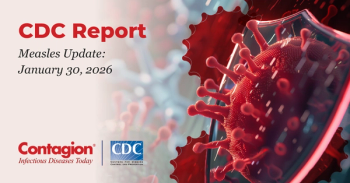
For Men, Prior COVID-19 Infection May Boost Immune Response to Influenza Vaccination
“This was a total surprise,” said study lead author John Tsang, PhD.
With
Acute viral infections can induce a durable immune response long after recovery, but it is largely unknown if they affect the homeostatic immune state and protect against other future infections.
A new
Lead investigator John S. Tsang, PhD, was inspired to complete this research and test his long-standing belief that the immune system reverts to previous stable baseline after viral infection. Tsang is a professor of immunobiology and biomedical engineering at Yale.
Tsang and his team utilized longitudinal multimodal single cell analysis (surface proteins, transcriptome, and V(D)J sequences to compare baseline immune status and response to influenza vaccination between individuals who had and had not contracted COVID-19.
The study cohort included 33 healthy participants who had recovered from a mild (non-hospitalizing) COVID-19 infection. These individuals had been diagnosed with COVID-19 an average of 151 days before this study began.
There was also a control group of 40 participants who had never contracted COVID-19. These individuals were matched by age and sex to the primary study group.
At baseline, regardless of time since COVID-19 infection, the primary cohort had elevated T-cell activation signatures and lower expression of innate immune genes in monocytes.
After flu vaccination, the men who had been infected with COVID-19 produced more flu antibodies and increased levels of interferons.
Compared to other individuals in the study, the men who had recovered from COVID-19 exhibited higher innate, influenza-specific plasmablast, and antibody responses after COVID-19 infection. The investigators noted this is partly attributable to the male recoverees exhibiting higher IL-15 responses soon after receiving a flu vaccine. Even before flu vaccination, the men who recovered from COVID-19 had elevated frequencies of memory-like CD8+ T-cells IFNγ upon IL-15 stimulation.
The results indicate recovering from a COVID-19 infection altered the baseline immune status of men and changed how their bodies responded to other pathogens.
“This was a total surprise,” said Tsang. “Women usually mount a stronger overall immune response to pathogens and vaccines, but are also more likely to suffer from autoimmune diseases.”
Since the beginning of the pandemic, it has been well documented that men are more likely than women to contract severe or fatal COVID-19. Unexpectedly, men who recovered from a mild COVID-19 infection mounted a stronger immune response to flu vaccination than women who experienced mild COVID-19, and men and women who had never contracted COVID-19.
“Viral infections in humans can establish new set-points impacting future immune responses in an antigen-agnostic manner,” the study authors concluded.
There is a great deal of interest in examining the long-term impact of COVID-19 on the body. More than 600 million people across the world suffer from “long COVID,” or post-acute sequalae of COVID-19.
These findings suggest there may actually be a benefit of COVID-19 infection, specifically boosted protection against influenza, albeit only for men.
Newsletter
Stay ahead of emerging infectious disease threats with expert insights and breaking research. Subscribe now to get updates delivered straight to your inbox.

































































































































